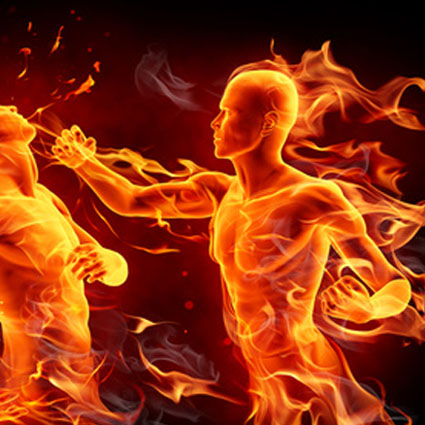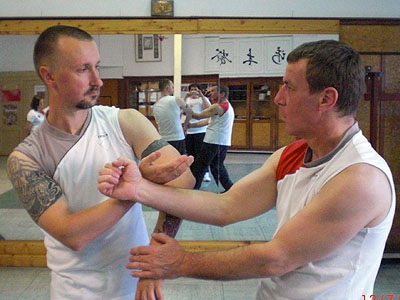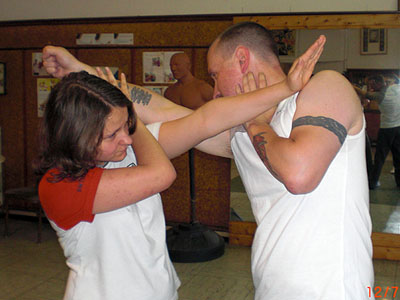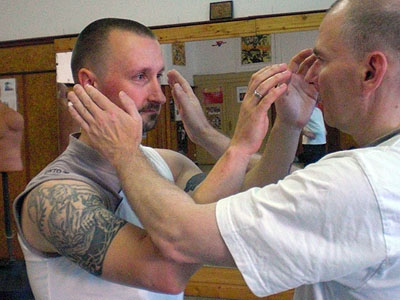Fighter or warrior
"What will you do with all that power, boys?"
Perhaps you have also asked yourself this question when the adrenalin starts to surge again. Let me describe my very personal experiences on the subject.
My name is Mathias, 7th SG in WingTsun, born in 1971, father of two children and working as a personal coach. When I started learning WingTsun in 2006 (with breaks for babies), my SiFu Oliver Hage, 5th PG asked me during a private lesson whether I knew the difference between a fighter and a warrior.
At the time I was a member of an international motorcycle club, but even before this I had always had some sort of ego problems. I joined the club to enjoy the social scene, club outings and parties, to have a sense of adventure and not least to confront my fear of aggression. Sifu Hage seemed to sense my dilemma intuitively. On the one hand I wanted to familiarise myself with fighting and aggression to overcome my fear of them, but on the other I have a deep distaste for aggression and violence.
He explained that a fighter fights for the sake of fighting. He perfects his fighting style to become the best. Warriors, on the other hand, were primarily farmers, tradesmen and family men who reached for their weapons when their own lives, their livelihood and/or their families were threatened, so as to defend them by any means. When the danger was past, they put down their weapons and resumed their normal working activities.
Research in the internet confirms that in some cultures based on a tribal, family or clan structure with no social strata, which lived by farming and animal husbandry, the members of these societies closely resembled the above description of a warrior. Examples include the original Scottish clans or the Slavic tribes.
However things actually might have been, I like this simple division in meaning as I can visualise it for myself. Perhaps you have immediate mental associations as well.
Do I want to be a fighter or a warrior?
 What makes a fighter a fighter? A fighter fights. He not only practices, he fights against others. To practice dealing with aggression and violence, I started sparring in addition to my WingTsun lessons. I know that this is not to be compared with a real fight, where the adrenalin rush is much stronger and harder to control – if you can control it at all. And you are never sure if you will emerge unscathed. But as far as it seemed possible for me, it brought me closer to real fighting situations.
What makes a fighter a fighter? A fighter fights. He not only practices, he fights against others. To practice dealing with aggression and violence, I started sparring in addition to my WingTsun lessons. I know that this is not to be compared with a real fight, where the adrenalin rush is much stronger and harder to control – if you can control it at all. And you are never sure if you will emerge unscathed. But as far as it seemed possible for me, it brought me closer to real fighting situations.
So what should be the next best step towards becoming a fighter? Look for an opponent for a real fight? The vast majority of would-be fighters would no doubt instinctively look for a victim where victory is sure. As an individual in the street or in a bar, I think hardly anyone would intentionally look for stronger and above all alert opponents if there are easier targets with a greater chance of victory and less risk to oneself.
But what would I gain by doing this? Would I gain in self-respect at the expense of some poor fellow, just because my ego is patting me on the shoulder for battling with my personal problem? When I thought about this I felt really bad. In my search for answers to the questions "Who do I want to be?" and "How can I make that happen?" I came across the books "Dead or Alive", "Hunting the Shadow" and above all "Warrior" by Geoff Thompson. This is when I really realised that in the final analysis, fighting for the sake of fighting, just to satisfy the personal ego, is just an escape from one's own weaknesses in other areas of life.
Of course we have all heard this cliché countless times, but now it really made sense to me: if you are dissatisfied with yourself, your job, your marriage, you have money problems or you object to the political situation, this dissatisfaction releases a great deal of energy – i.e. power – which you can direct into fighting to give it an escape valve or direction. If you only have fighting and aggression in your head, you will carry it around everywhere with you, and see a potential opponent in everybody you meet. Everything you hear might be a threat, insult or challenge. If you give way to your ego you may become a feared bruiser, but this will not solve all the other problems. This is not the way to take responsibility for the other areas of one's life.
 Instead you are concealing your inability to give the right answers to all situations in life behind the mask of the fighter, and at the expense of some hapless victim. That would not really be me, however. Moreover, I was somehow proud that I had retained a certain decency which I used to perceive as my weakness. All in all, I would prefer to be the warrior as described above.
Instead you are concealing your inability to give the right answers to all situations in life behind the mask of the fighter, and at the expense of some hapless victim. That would not really be me, however. Moreover, I was somehow proud that I had retained a certain decency which I used to perceive as my weakness. All in all, I would prefer to be the warrior as described above.
"All aspects in life require a warrior mentality," Thompson writes. This means taking responsibility for one's entire life: job, family, health, attitude to life, success and self-esteem.
The first strength principle in WingTsun says: "Free yourself from your own strength". I understand strength to mean pressure or unwarranted energy in combat, and generally in all unpleasant situations in life.
How does this unwarranted energy manifest itself in daily life: is it pounding the keyboard because I hate my job? Is it screaming around the house because everything seems to be left to me as usual? Is it getting blind-drunk, which I need to "switch off" from time to time? Perhaps it is the foul mood I get into when I watch the news on TV. Perhaps the envy and self-pity I feel when I see my neighbour's new car. The list is endless…
Taking responsibility for my actions
 I now use my energy in a different way. I invest it in further professional training, bring order into my finances, take more time for my family and attend WT training more regularly. I want to take over the rudder myself, and try not to let my "shadows", as Thompson calls them, control me and whisper in my ear: "The government, the tax authorities, your boss, your children etc. are to blame for your situation. There is nothing you can do about it anyway. They will all do you down if you are not careful. The next person who makes problems gets a smack in the mouth …".
I now use my energy in a different way. I invest it in further professional training, bring order into my finances, take more time for my family and attend WT training more regularly. I want to take over the rudder myself, and try not to let my "shadows", as Thompson calls them, control me and whisper in my ear: "The government, the tax authorities, your boss, your children etc. are to blame for your situation. There is nothing you can do about it anyway. They will all do you down if you are not careful. The next person who makes problems gets a smack in the mouth …".
And best of all, this responsibility thing really works. I recognised that just winning fights could not make me the person I wanted to be. When I left my club for family reasons one year later, because my priorities had changed as did my environment, where fighting was accepted as part of human nature, fighting and aggression suddenly ceased to play such an important role. My views and attitude changed. I treated people differently, and they responded differently. I now feel that success is possible in many other areas of life. My life is more varied.
 Naturally I am far from being free from fear and aggression. In certain situations it is very easy to fall back into old thinking and behaviour patterns, but I am trying to gradually replace them with new ones. At one time I would react as follows in critical traffic situations: "Why is that fool cutting me up with his show-off car?! Is he looking for trouble?! Is he trying to force me off the motorway? I'll soon show him!" Nowadays I tend to think: "Well, maybe he needs the satisfaction. I won't let it bother me, nothing in it for me. If I go rushing after him I'll just burn up expensive fuel. And what if I catch up with him anyway …? Am I going to do a stunt turn and force him to stop? No sense in that. After all, nothing happened and he didn't mean it personally, we don't know each other."
Naturally I am far from being free from fear and aggression. In certain situations it is very easy to fall back into old thinking and behaviour patterns, but I am trying to gradually replace them with new ones. At one time I would react as follows in critical traffic situations: "Why is that fool cutting me up with his show-off car?! Is he looking for trouble?! Is he trying to force me off the motorway? I'll soon show him!" Nowadays I tend to think: "Well, maybe he needs the satisfaction. I won't let it bother me, nothing in it for me. If I go rushing after him I'll just burn up expensive fuel. And what if I catch up with him anyway …? Am I going to do a stunt turn and force him to stop? No sense in that. After all, nothing happened and he didn't mean it personally, we don't know each other."
The "middle way"
It is not without reason that there are three further strength principles in WingTsun. They concern the strength of the opponent, which is directed against us whether we like it or not, and we can only indirectly influence. What if somebody wants to make life difficult for us despite our laid-back attitude? Where is the boundary between "not taking everything personally" and self-effacement in the search for harmony, so that self-defence does not become "might is right" owing to an inflated ego?
As everywhere in life, it is a matter of balance, of the "middle way" or "golden mean". This middle way between the two extremes of a weak and an excessive ego is a healthy self-esteem. According to Nathaniel Branden, a well-known psychologist, this includes the sense of responsibility, personal integrity and self-assertion referred to above. This is precisely why I learn WingTsun – since the end of 2011 I have been with Sifu Heiko Olear in Wiesbaden.
 We regularly practice how to handle classic ritual combat situations, where the starting phase of the BlitzDefence programme makes our own position unmistakably clear when it comes to the preservation of our own life and health, or that of family and friends.
We regularly practice how to handle classic ritual combat situations, where the starting phase of the BlitzDefence programme makes our own position unmistakably clear when it comes to the preservation of our own life and health, or that of family and friends.
However, self-assertion is also important where personal freedom is concerned. There is no need to put up with being unable to move freely and relax.
The example of problems young people have with playground bullies at school is an obvious one. You have to go to school every day. Changing schools is not always an easy option. So you cannot really avoid the problem. After all, you don't want to hide in the lavatories every time there is a school break.
Another example is the classic collision in a pub, bar or fairground, where you unintentionally spill beer on a slightly inebriated stranger. He immediately starts swearing and cursing, threatening to thump you.
If this kind of situation made you decide to avoid potential stress and no longer go to bars and fairgrounds in future, you would be giving up your right to personal freedom. That being said, personal freedom is always subjective. Everybody must define it for himself, and take personal responsibility.
Personally, for example, I see no point in standing up for my rights in some crummy bar full of drunken losers who are looking for trouble if I feel much more comfortable elsewhere and am made to feel welcome. On the other hand, I enjoy taking my family to the fair and insist on my right to do so. At the same time I am aware that stress can sometimes arise with others, especially when a certain alcohol level is reached.
I now find that with a friendly, relaxed basic attitude I come in for far less stress at such events than before, when I glared at people, was full of adrenalin and always on the look-out for potential trouble-makers owing to my own ego problems. The whole thing is something of a self-fulfilling prophesy: if you expect aggression you will be ready to fight, and you will consciously or unconsciously move and behave accordingly. Consciously or unconsciously, others will respond to your behaviour, feel threatened by your demeanour and tend to become aggressive in turn.
However, if you free yourself from your own strength and exude a healthy self-esteem, it is possible to break this spiral.
Conclusion and suggestion
 Let me finish by coming back to the first strength principle. For me, freeing myself from my own 'strength' is still the hardest thing to do when in conflict or in other unpleasant situations. But then nobody said that it was easy. As Thompson describes it, that is precisely what makes a warrior: he consciously chooses the more difficult path so that he can grow as a result.
Let me finish by coming back to the first strength principle. For me, freeing myself from my own 'strength' is still the hardest thing to do when in conflict or in other unpleasant situations. But then nobody said that it was easy. As Thompson describes it, that is precisely what makes a warrior: he consciously chooses the more difficult path so that he can grow as a result.
So do not listen to your ego when it starts shouting in your ear: "What the hell! What does this fool want from me?", or "Why is this happening to me yet again …?". Instead shift down by one gear, free yourself from your strength and ask yourself: "How can I deal with this situation most sensibly?".
In order to follow this new thinking and behavioural pattern, it is first necessary to be aware that you are in a stressful situation. Usually these occur very suddenly, without any possibility of control, and it is only later that you realise what happened as if automatically. There is a simple trick that can help you to be aware of situations in which you are under stress: before going into a situation where you expect stress, slip a conventional rubber band over your wrist and snap it against the wrist when you become agitated. Many will already do this automatically. The more agitated you become, and the more the adrenalin flows, the harder you snap it against your wrist. This will divert your attention from the actual target of your strength to the pain in your wrist. This disrupts behaviour patterns that have been instilled over many years and are automatically initiated by uncontrolled bursts of adrenalin – for example swearing, anger, threats, shouting and sheer aggression. It quickly clears you mind for other thoughts, so that you can handle the situation reasonably and responsibly.
I hope that this report of my own experiences will help some to avoid mistakes.
Text: Mathias Weller, 7th SG
Photos: WingTsun school in Wiesbaden/fotolia


